November 11 2018

Prior to the announcement of the date for local government elections, there was speculation, particularly in Opposition circles, that the Government would find reasons not to hold the elections. It was believed that the Government had performed so badly that it would suffer significant losses and would not want to expose its flank, now that general elections are only two years away. The announcement in July by the Minister of Communities, Mr. Ronald Bulkan, that local government elections would be held on November 12th killed that speculation. The more significant news came later. It was reported that APNU and the AFC could not agree on a joint slate for the elections and would be going to the electorate separately.
The long term viability of the coalition was put on the table. But observers welcomed the opportunity that it would offer in giving some indication of the relative strengths of the political parties, not by the number of seats they win, because of the element of the first past the post system in the elections, but by the number of votes that they obtain. Caution would have to be exercised in such assessments because of the expected low turnout, unless polls are conducted to determine the percentage turnout of supporters of each of the three contesting parties. Polls such as these are complicated and are not conducted in Guyana.
The campaign has not met with great public enthusiasm. The coalition has suffered criticism for a poor economy, reports of corruption and bad governance, for the findings of the Auditor General’s Report and the absence of President Granger, who has been receiving medical attention in Cuba over the past two weeks. Prime Minister Moses Nagamootoo, known as a dynamic election campaigner while in the PPP, has had to concentrate in rejuvenating the flagging fortunes of the AFC, which has been receiving very small turnouts at its public meetings. It might well be that these factors will result in an especially low turnout of the governing parties’ supporters and will suppress their overall results. PNC/PNCR/APNU supporters have traditionally stayed away from the polls since the 1979 Referendum when wishing to express their disapproval.
In Guyana’s history, local government was once a significant element in public affairs. It started with the village movement when freed slaves purchased many estates and commenced the golden era in colonial times of village democracy, which was later enshrined into law. However, local democracy became a victim of rigged elections from the 1970s. The 1974 local elections were aborted because its rigging was exposed early in the process. Local government elections were not held again until 1994, after democracy was restored and the PPP/C was in office. Thereafter, this time on the pretext of ongoing discussions to reform the system between the Government and Opposition, local government elections were again delayed until 2016, after the PPP/C lost the general elections in 2015. These local government elections are therefore somewhat of an historical landmark. It is the first time that a second successive local government elections are held at all and on time in 45 years. The credit goes to the APNU+AFC coalition.
There is little in the management of local government affairs to enthuse the population. The mandate of NDCs is limited and so is their income, based on handouts from the Government. They are generally not permitted by their political bosses to raise their income by taxes for fear of alienating voters. The handouts from the Government are so limited that they hardly make an impact on the communities that they have jurisdiction over. Allegations of corruption and wrongdoing are rife.
Absent from their agendas is local mobilisation – the exercise of local democracy or involvement of communities in the affairs of NDCs. Cheddi Jagan was a firm advocate of local democracy. Under his administration in the early 1990s Community Development Councils were established to propose and monitor development projects in local communities. He advocated for, among other democratic initiatives, the publication of infrastructure contracts so that local communities would be able to ensure that the contracts were performed in accordance with their terms.
These worked in PPP supported communities for a while but degenerated into political, as opposed to community, support groups. This government has shown little interest in anything more than the form, rather than the substance, of local democracy. Issues of local mobilisation, involvement and monitoring remain unattended. The mandates and financing of NDCs have not been expanded. In the absence of these over the years, local interest has been modest, to put it mildly, and is another reason why the turnout will be low. If PPP supporters make a stronger showing, it would be because they are voting on national issues.
In Guyana, the turnout at general elections is usually over 70 per cent. There was a 72 per cent turnout in 2015. The Elections Commission reported a turnout of 47 per cent at the local government elections of 2016 as opposed to 48 per cent in 1994. The results of these elections may give a hint of the outcome of the general elections in 2020.
This column is reproduced, with permission, from Ralph Ramkarran’s blog, www.conversationtree.gy
